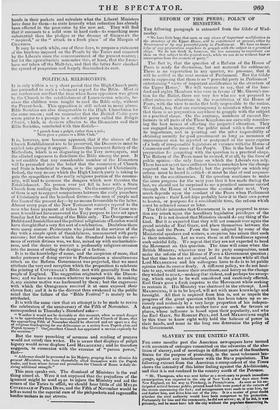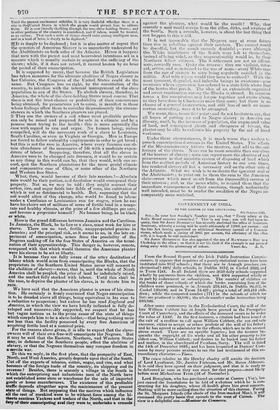SLAVERY IN THE UNITED STATES.
FOR some months past the American newspapers have teemed with accounts of outrages committed on the advocates of the abo- lition of slavery, and of meetings in different parts of the Southern States for the purpose of protesting, in the most vehement lan- guage, against any interference with the Slave population. The following extract from the American cerrespondent of the Times shows the intensity of this bitter feeling against the Abolitionists, and that it is not confined to the country south of the Potomac.
"Mr. Thompson, who was sent hither as a missionary to preach immediate emancipation, was expected in the city of New York a few days since from New England, on his way to Pittsburg, in Pennsylvania. As soon as his an- ticipated arrival became public, printed hand-bills were posted at the corners of the streets announcing the fact; and arrangements were made to seize him, tar and feather him, and drive him out of the city. It is a matter of great doubt whether the civil authority would have been competent to his protection. Fortunately for him and the community, he did not arrive; or, if he did, it was privately, and be must have left the city without the populace discovering it.
Until the present excitement subsides. it is very doubtful whether there is a city in theiUnited States in which the people would permit him to address them. Ik is now literally skulking through the non-slave-holding States; and in other portions of the country is considered, and if taken, would he treated, as an outlaw. That such a state of things should exist among intelligent men, and in a land of laws, is deeply to be deplored."
t is deeply to be deplored ; but it is also matter of regret that the question of American Slavery is so imperfectly understood by the Abolitionists on both sides of the Atlantic. Hence it happens that men with the purest and most benevolent intentions act in a manner which is morally certain to augment the sure' ing of the slaves; while, if it does not retard, it cannot hasten by an hour the period of their emancipation.
It is supposed by many, that because the British Legislature has taken measures for the ultimate abolition of Negro slavery in her Colonies, the Congress of the United States could do the same. But Congress has no right, by the constitution of the country, to interfere with the internal management of the slave population in any or the States. To abolish slavery, therefore, in America, the whole of the slave-holding States must concur. That there is not the least chance or probability of their concurrence being obtained, for generations yet to come, is manifest to those whose feelings allow them to consider dispassionately the circum- stances in which the Southern planters are placed.
;: They are the owners of a soil whose most profitable produce can only be raised and prepared for sale in a climate and by a process most trying to the health : this is more especially the ease with regard to rice and sugar. No human being, unless
• compelled, will do the necessary work of a slave in Louisiana, South Carolina. or even in Virginia or Georgia. Men in Europe are forced to follow unhealthy employments in order to get bread ; but this is not the case in America, where every freeman can ob- tain abundance of the necessaries of life with a moderate expen- diture of labour. Supposing, therefore, that all the slaves in America were to be changed into freemen, it would be as certain as any thing in this world can be, that they would, with one ac- cord, quit the Southern plantations for the more genial climate and comparative ease of Ohio, or some other of the Northern and Western free States.
What, then, would become of their late masters ?—Absolute ruin would be their portion, and desolation would overspread their property. Not so, we may be told : they might convert their cotton, rice, and sugar fields into fields of corn, the cultivation of which is not so detrimental to health. But, supposing that the soil would allow of this change, who would be found to labour under a Carolinian or Louisianian sun for wages, when he can bave his choice out of millions of acres of fertile land in a tempe- rate and healthy climate, at the price of a few shillings per acre, and become a proprielor himself? No human being, be he black or white.
Here is the grand difference between Jamaica and the Carolinas. In Jamaica, the Black, be he free or a slave, must work for hire or starve. There are no vast, fertile, unappropriated prairies in Jamaica ; and the principal risk, as it seems to us, in the late ex- periment of emancipation, arises from the possibility of the
Negroes making off for the free States of America on the termi- nation of their apprenticeship. This danger is, however, remote, compared with that which would threaten the American planter were his slaves to be set at liberty.
It is because they are fully aware of the utter destitution of labour which would arise from emancipating the Blacks, that the proprietors in the Southern United States never will consent to the abolition of slavery—never, that is, until the whole of North America shall be peopled, the price of land be indefinitely raised, and the market fully stocked with labour. Until this shall be the case, to deprive the planter of his slaves, is to devote him to ruin.
We have said that the American planter is aware of his situa- tion. He certainly is firmly convinced that Negro emancipation is to be dreaded above all things, being equivalent in his case to
a reduction to pauperism; but unless he has read England and America, in which the view we have briefly indicated is fully de- veloped and unanswei.ably supported, we suspect that he has but vague notions as to the prime cause of the state of things which compels him to be a slave-holder,—that being nothing more nor less than the facility possessed by every free American of acquiring fertile land at a nominal price.
For the reasons above given, it is idle to expect that the slave- owners will of their own free-will emancipate the Negroes. But
it may be said that the Eastern, Northern, and Western States may, in defiance of the Southern people, effect the abolition of slavery, or that the Negroes themselves may conquer freedom in a servile war.
To this we reply, in the first place, that the prosperity of East, North, and West America, greatly depends upon that of the South. Cut off the exports of tobacco, cotton, sugar, and rice, and what becomes of the foreign trade of the country, its shipping and its revenue ? Besides, there is scarcely a village in the South in which the enterprising and industrious men of the North have not established some store or warehouse for the sale of imported goods or home manufactures. The existence of this profitable traffic depends altogether upon the maintenance of the present state of things. But supposing that the motives which influence all the rest of mankind were to be without force among the hi- therto cautious Yankees and traders of the North, and that in the fury of their emancipating zeal they were to undertake a crusade against the planters, what would be the result ? Why, that scarcely a soul would esenpe from the rifles, dirks, and swamps of the Soutti. Such a crusade, however, is about the last thing that can happen in this world.
It is not impossib7e that the Negroes may at some future time rise in rebellioa against their masters. The contest would ba dreadful, but the result scarcely doubtful ;— evee although. the White inhabitants of the South were left to themselves, instead of being aided, as they unquestionably would be, by their. Northern fellow citizens. The S.aitherners are not an effemi- nate, cowardly race. Quite the reverse: they arc %igilant, intre- pid, active, and atemstomed to the use of arms—every White man from the age of sixteen to sixty being regularly enrolled in the militia. And with whour would they have to contend? With the most ignorant, degraded, and imbecile beings in existence—poor creatures whom oppression has reduced to a state little above that of the brutes that pen-h. The idea of an extensively organized and secret combination amen g the Blacks is absurd. In separate towns a few conspirators may league together and excite alarm, as they have done in Charleeton more than once; but there is no chance of a generai insurrection, awl still less of such an insur- rection succeeding, were it to be attempted.
We recur, then, to our first point: and do not hesitate to say, that all hopes of putting an cad to Negro shivery in America are illusory, until, by the increase of population, the augmented value of land, and consequent plenty and cheapness of lebaur, the planter may be utile to cultivate his property by the aid of hired workmen.
Under these circumstances, it is much worse thee useless to preach emancipation dectrines in the United States. The efforts of the Missionat ies only irritate the masters, and add to the suf- ferings of the slaves. None can be more sensible than ourselves of the horrors of slavery ; none can regret more the adoption of and perseverance in that impolitic system of disposing of land which from the earliest periods of American history to our own times, has rendered slavery all but a necessary evil on the other side of the Atlantic. What we wish is to moderate the ignorant zeal of the Abolitionists ; to point out to them the ruin to the American slave-owner which must re.etlt from the (impossible) success of their mission ; and, in the mean while, to remind them that the immediate consequences of their exertions, though undoubtedly well intended, must be to render the condition of the Negro in- comparably more wretched.



























 Previous page
Previous page